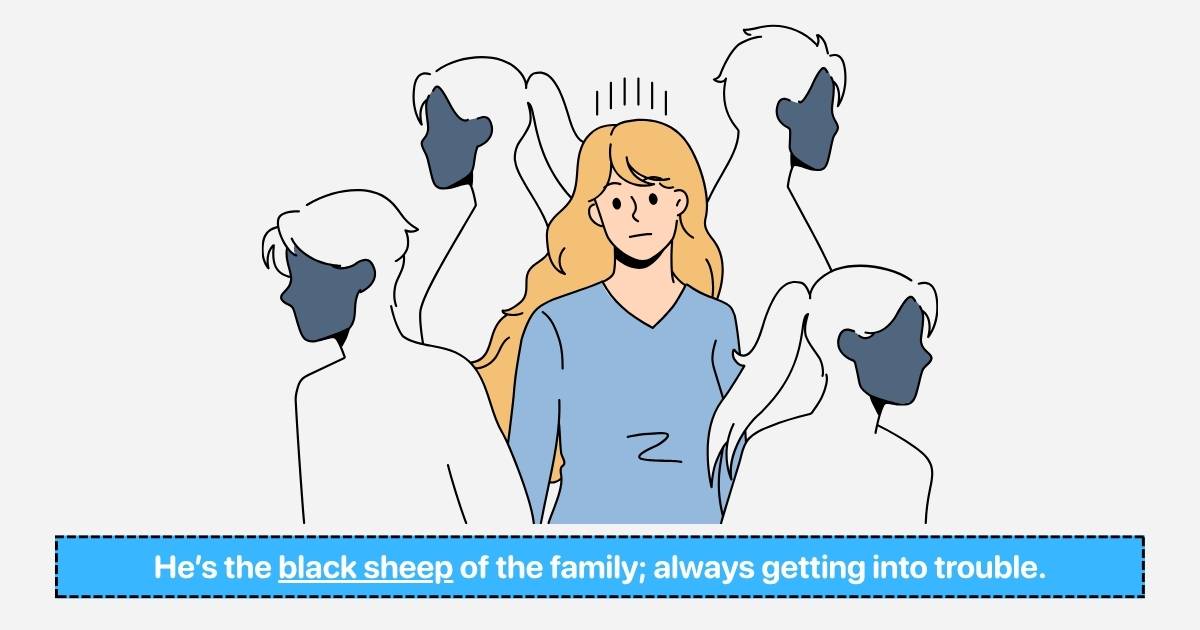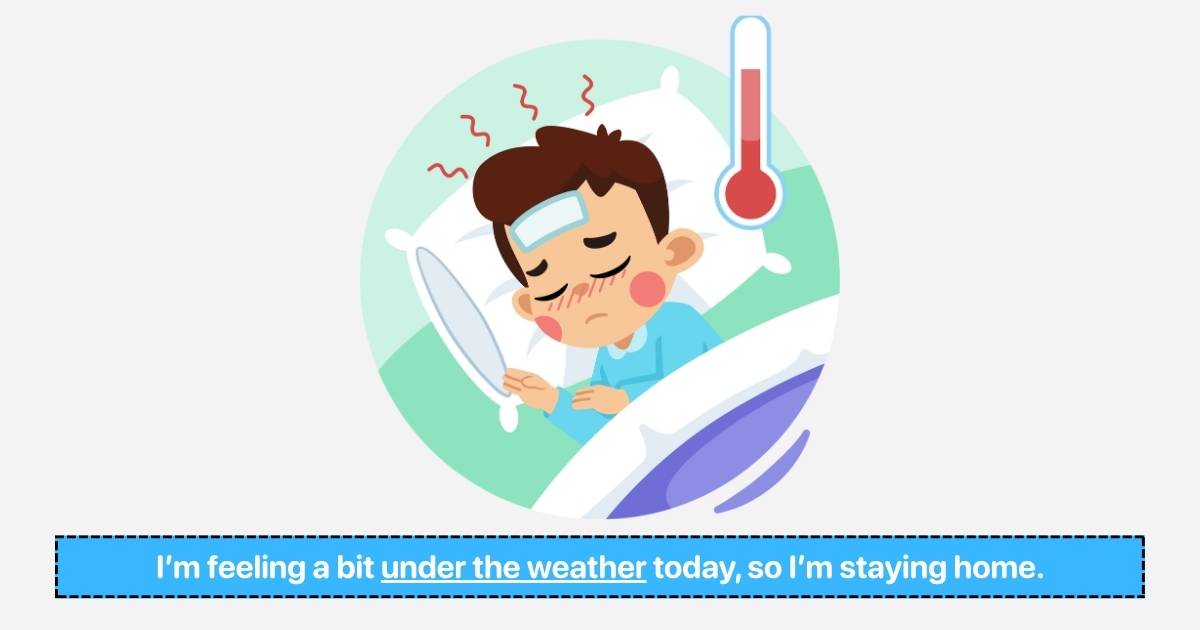What Are Common English Idioms?
An idiom is a phrase or expression whose meaning cannot be understood from the literal meanings of the words it contains. Idioms often carry a figurative meaning, and they are commonly used in everyday speech.
Example of an idiom: Break the ice: To make people feel more comfortable in a social situation.
Learn English idioms allows you to sound more like a native speaker, making your conversations feel more natural and engaging. Additionally, understanding idioms helps improve your comprehension and appreciation of English literature, movies, and media.

Read more: 30+ Common English Phrases for Daily Use
40 Common English Idioms
Now, let’s dive into some of the most common English idioms and learn how to use them in different contexts.
Idioms About People
Here are some popular idioms related to people:
| Idiom | Meaning | Example |
| A black sheep | A person who is different from the others, often in a negative way. | He’s the black sheep of the family; always getting into trouble. |
| A couch potato | A person who spends a lot of time sitting and watching TV. | Stop being a couch potato and go for a walk! |
| A man of his word | A person who keeps their promises. | John is a man of his word, so I trust him with the task. |
| Social butterfly | Someone who is very sociable and enjoys being with people. | Emily is a social butterfly who attends every party in town. |
| Jack of all trades | A person who can do many different types of work but may not be an expert in any. | My uncle is a jack of all trades, he can fix cars, cook, and build furniture. |
| People person | Someone who is good at interacting with others. | As a receptionist, you need to be a people person. |

Idioms About Time
Idioms related to time can be quite useful in conversations.
| Idiom | Meaning | Example |
| In the nick of time | Just in time; at the last moment. | I arrived in the nick of time to catch the bus. |
| Once in a blue moon | Something that happens very rarely. | We only meet once in a blue moon, but it’s always great. |
| Time flies | Time passes very quickly. | I can’t believe it’s already November! Time flies. |
| Beat the clock | To finish something before the deadline. | We managed to beat the clock and submit the project early. |
| Around the clock | All day and all night without stopping. | The hospital works around the clock to care for patients. |
| Call it a day | To stop working for the day. | Let’s call it a day and continue tomorrow. |

Idioms About Weather & Nature
Nature-inspired idioms can bring color to your language.
| Idiom | Meaning | Example |
| Under the weather | Feeling ill or unwell. | I’m feeling a bit under the weather today, so I’m staying home. |
| It’s raining cats and dogs | It’s raining heavily. | Don’t forget your umbrella, it’s raining cats and dogs outside! |
| A storm in a teacup | A lot of fuss over a small problem. | Don’t worry, it’s just a storm in a teacup. Everything will be fine. |
| Come rain or shine | No matter what the weather or circumstances are. | He goes jogging every morning, come rain or shine. |
| Chase rainbows | To pursue unrealistic goals. | Starting that business without a plan is like chasing rainbows. |
| Every cloud has a silver lining | There is something good in every bad situation. | Losing that job was hard, but it led me to a better career, every cloud has a silver lining. |

Idioms About Emotions
Idioms related to emotions help express feelings more vividly.
| Idiom | Meaning | Example |
| On cloud nine | Extremely happy or in a state of bliss. | She was on cloud nine after hearing the good news. |
| Cry over spilled milk | To be upset about something that can’t be changed. | There’s no use crying over spilled milk, just fix the mistake. |
| Burning with anger | Feeling extremely angry. | He was burning with anger after the unfair treatment. |
| Green with envy | Very jealous. | She was green with envy when she saw her friend’s new car. |
| In high spirits | Feeling cheerful and lively. | Everyone was in high spirits during the celebration. |
| Down in the dumps | Feeling sad or depressed. | He’s been down in the dumps since he lost his job. |

Idioms About Success & Failure
These idioms help express success and failure in different situations.
| Idiom | Meaning | Example |
| Hit the nail on the head | To describe exactly what is causing a situation or problem. | You hit the nail on the head with that suggestion. |
| A dead-end job | A job that does not lead to any career advancement. | He quit his dead-end job to pursue his dream career. |
| Back to square one | Starting over after a failure. | After the failure, we had to go back to square one and come up with a new plan. |
| The sky’s the limit | There is no limit to what can be achieved. | With your talent, the sky’s the limit. |
| Learn the ropes | To learn how to do a particular job or activity. | It took her a month to learn the ropes at her new job. |
| Go the extra mile | To make more effort than expected. | Our team always goes the extra mile to satisfy customers. |

Animal Idioms
Animal-related idioms add a playful touch to your language.
| Idiom | Meaning | Example |
| Let the cat out of the bag | To accidentally reveal a secret. | He let the cat out of the bag about the surprise party. |
| A wild goose chase | A futile or hopeless search. | Trying to find that book was a wild goose chase. |
| The lion’s share | The largest portion. | She got the lion’s share of the credit for the project. |
| Kill two birds with one stone | To achieve two things at the same time. | I killed two birds with one stone by shopping while waiting for my car to be repaired. |
| Busy as a bee | Extremely busy and active. | She’s been busy as a bee preparing for the event. |
Food Idioms
Food idioms are commonly used in both formal and informal settings.
| Idiom | Meaning | Example |
| A piece of cake | Something that is very easy to do. | The exam was a piece of cake for her. |
| Spill the beans | To reveal a secret. | She spilled the beans about the surprise. |
| Full plate | To have a lot to do. | I have a full plate today with work and meetings. |
| Bite off more than you can chew | To take on a task that is too big. | Don’t bite off more than you can chew by accepting so many projects. |
| Have a sweet tooth | To like sweet foods. | I have a sweet tooth and can’t resist chocolate. |

See also: Top 100 Most Common Words in English Language for Beginners
How to Learn and Use Idioms Correctly
Learning and using idioms effectively requires practice and context. Here are some tips for mastering idioms:
- Learn idioms in context: Don’t just memorize idioms, but learn them in real-life contexts, such as reading books, watching movies, or conversing with native speakers.
- Use idioms sparingly: While idioms can make your speech more colorful, overusing them can make you sound unnatural. Use them at the right moments to sound authentic.
- Understand the meaning: Make sure you understand the meaning behind each idiom. Using an idiom incorrectly can confuse others and make you sound unprofessional.
- Practice with examples: Incorporate idioms into your daily conversations or writing. The more you use them, the more naturally they’ll come to you.
See also: How to Learn English Fast: 13 Proven Tips for Quick Results
By practicing these techniques, you’ll improve your ability to use common English idioms and enrich your language skills. If you’re eager to enhance your understanding of idioms and other English expressions, visit GuruLango Blog for more resources and exercises to help you on your learning journey!